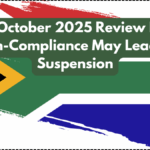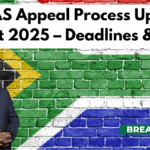South Africans may soon see relief at the petrol pumps as the government evaluates the South Africa Fuel Cap Proposal for late 2025. Rising inflation, driven by global oil volatility and currency depreciation, has placed immense pressure on consumers and businesses. In response, the Department of Mineral Resources and Energy (DMRE) is now reviewing a framework to introduce a fuel price control mechanism that could stabilize petrol and diesel costs nationwide.
This proposed cap aims to shield South African households from future price spikes while supporting food distribution, transport, and other inflation-sensitive sectors. If passed, this policy could be one of the most significant interventions in the fuel sector in over a decade.

What Is the Fuel Cap Proposal?
The South Africa Fuel Cap Proposal would establish a maximum price per litre for fuel, allowing government regulation of how much petrol stations can charge. It may also include:
-
Fixed wholesale margins
-
Capped retail prices
-
Subsidies for logistics and rural fuel supply
-
Revised fuel tax calculations
The primary objective is petrol price control, especially in response to the rapid escalation of fuel costs in early 2025, which contributed significantly to food price hikes and broader inflation trends.
Key Elements of the Proposed Fuel Policy
To better understand the proposed legislation, here’s a breakdown of the major components:
| Component | Description |
|---|---|
| Maximum Retail Price | Government-set cap on per-litre petrol price |
| Review Cycle | Quarterly price reviews based on global oil trends |
| Inflation Response | Linked to CPI to ensure affordability |
| Support Measures | Rural subsidies and supply-chain compensation |
| Enforcement | Penalties for stations exceeding the cap |
This model mirrors price control strategies implemented in other countries like India and Malaysia, which have successfully reduced fuel-related inflation volatility.
Implications for Consumers and the Economy
If enacted, the South Africa Fuel Cap Proposal would benefit consumers by bringing more predictability to fuel expenses. It also supports economic sectors such as agriculture and transport, which are heavily reliant on fuel inputs.
Expected benefits include:
-
Lower transport costs for goods and commuters
-
Stabilized grocery prices
-
Reduced pressure on wage demands due to inflation
-
Government control over speculative fuel pricing
However, critics warn that the cap must be carefully managed. Without adequate subsidies or flexibility, it could lead to fuel shortages or black-market sales.
Challenges and Industry Feedback
While the fuel price control plan has been welcomed by many civil organizations and trade unions, the petroleum industry has raised concerns. Fuel retailers argue that profit margins are already thin, and a capped pricing system could undermine operational sustainability.
Key concerns from industry stakeholders include:
-
Reduced income for small fuel retailers
-
Risk of underinvestment in rural fuel infrastructure
-
Delay in price adjustment when global oil prices drop
Government officials assure the public that stakeholder consultations will continue, and a pilot phase may be rolled out before the national implementation.
What Happens Next?
The fuel cap legislation is currently under review and could be presented in Parliament by Q4 2025. If approved, implementation could begin in early 2026, with the first price control adjustments expected by February 2026.
The Department of Mineral Resources and Energy is also conducting public awareness campaigns to educate citizens on how the cap will function and what to expect when it goes live.
Conclusion
The South Africa Fuel Cap Proposal is a timely response to the nation’s inflation crisis, driven in part by fluctuating petrol prices. By introducing a well-regulated petrol price control mechanism, the government hopes to create a more stable and affordable economic environment for South African families and businesses.
As discussions evolve, it’s clear that any decision will have far-reaching consequences—not just at the petrol pump, but across the national economy. Citizens are encouraged to stay informed and participate in public consultations where possible.
FAQs
What is the South Africa Fuel Cap Proposal?
It is a government initiative to set a maximum retail price for petrol and diesel to combat inflation.
When will the fuel price cap be implemented?
If approved, it could roll out by early 2026 following parliamentary approval in late 2025.
How will the price cap affect consumers?
It is expected to reduce fuel price volatility, lower transportation costs, and help stabilize inflation.
Will petrol stations lose revenue due to the cap?
Possibly. Some retailers are concerned about profit margins and long-term viability under capped pricing.
Is this cap permanent?
The cap will likely include a quarterly review system and may be adjusted based on inflation and fuel import costs.
Click here to learn more



